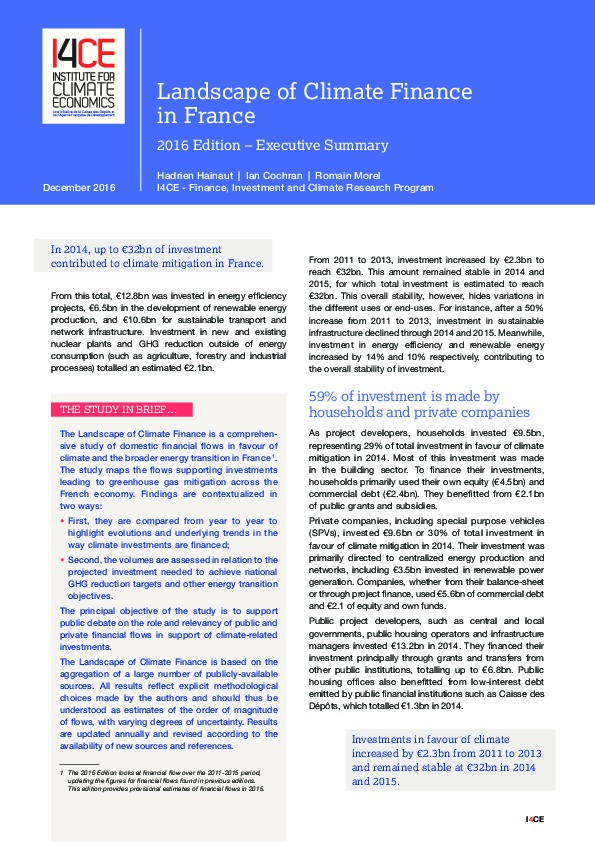Landscape of climate finance in France, 2016 Edition
The Landscape of climate finance is a comprehensive study of domestic financial flows in favor of climate and the broader energy transition in France. The study maps the flows supporting investments leading to greenhouse gas mitigation across the French economy. The principal objective of the study is to support public debate on the role and relevancy of public and private financial flows in support of climate-related investments.
The 2016 Edition looks at financial flow over the 2011-2015 period, updating the figures for financial flows found in previous editions. This edition provides provisional estimates of financial flows in 2015.
In 2014, up to €32bn of investment contributed to climate mitigation in France.
This total is made up of €12.8bn invested in energy efficiency projects, €6.5bn for the development of renewable energy production and €10.5bn for sustainable transport and network infrastructure. Investment in new and existing nuclear plants and GHG reduction outside of energy consumption (such as agriculture, forestry and industrial processes) totalled an estimated €2.1bn.
From 2011 to 2013, investment increased by €2.3bn to reach €31.9bn.
This amount remained stable in 2014 and 2015, for which total investment is estimated to reach €31.8bn. This overall stability hides variations in the different uses. For instance, after a 49% increase from 2011 to 2013, investment in sustainable infrastructure declined through 2014 and 2015. Meanwhile, investment in energy efficiency and renewable energy increased by 14% and 10% respectively, contributing to the overall stability of 59% of investment is made by households and private companies.
As project developers, households invested €9.2bn, representing 29% of total investment in favour of climate mitigation in 2014. Most of this investment was made in the building sector. To finance their investments, households primarily used their own equity (€4.2bn) and commercial debt (€2.3bn). They benefitted from €2.1bn of public grants and subsidies.
Private companies, including special purpose vehicles (SPVs) invested €9.6bn or 30% of total investment in favour of climate mitigation in 2014. Their investment went primarily in centralized energy production and networks, including €3.5bn invested in renewable power generation. Companies financed this investment at the project-level or at the company’s balance-sheet level, using €5.6bn of commercial debt and €2.1 of equity and own funds.
Public project developers, such as central and local governments, public housing operators and infrastructure managers invested €13bn in 2014. They financed their investment principally through grants and transfers from other public institutions, totalling up to €6.4bn. Public housing offices also benefitted from low-interest debt emitted by public financial institutions such as Caisse des Dépôts, totalled €1.3bn in 2014.

